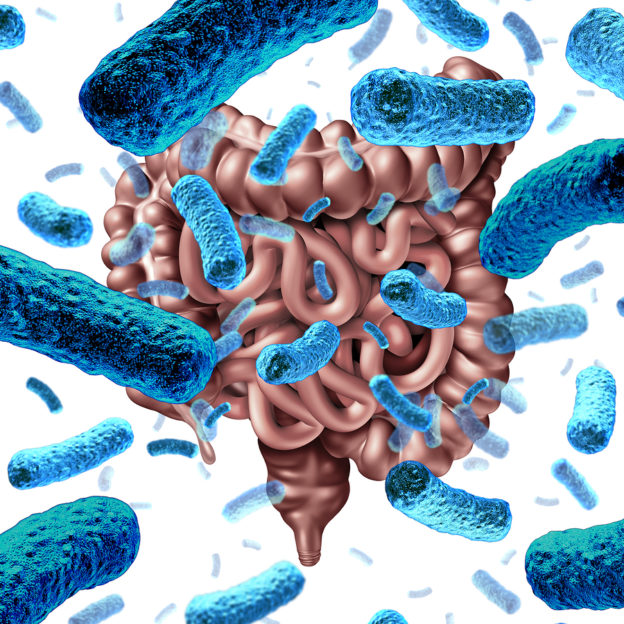By David Blyweiss, M.D., Advanced Natural Wellness
May 1, 2020
Remember… “You are what you eat!”
You know, my grandma used to say that all the time. But as a kid, it never made much sense. After all, I didn’t look anything like a broccoli sprout or a banana.
Years later, I learned the original phrase came about in 1825. Its original form was, “Tell me what you eat, and I will tell you what you are.”
Either way you state it, the general idea is the same… what you put in your mouth makes a big difference for what you’re building your body with.These days, the truth of this statement is especially important when it comes to the health of your gut microbiome.
You already know there are “good” and “bad” microbes in your gut.
And with all of the TV commercials for probiotic yogurts and supplements, simply eating more probiotics might seem like an easy fix. But that’s not the case.
Adding certain foods may help, but you also need to think about limiting other foods that are doing you harm.
Open your arteries, improve blood flow for a new health miracle...
Did you know your circulatory system has over 60,000 miles of arteries, veins and other blood vessels, if stretched end to end?
But as you age, your blood vessels undergo changes, which may cause them to stiffen, thicken and get clogged.
GOOD NEWS! Doctors have now identified a “Miracle Molecule” inside your arteries that helps OPEN your arteries and IMPROVE blood flow.
It’s what Dr. Valentin Fuster calls it, "One of the most important discoveries in the history of cardiovascular medicine."To you, that means...
- Healthy blood pressure
- Sharper mind and memory
- Skyrocketing energy and muscular strength
- Increased pleasure and passion in the bedroom
- Improved circulation to every cell and organ in your body
Go here to discover a new natural way to significantly boost the levels of this miracle molecule in YOUR body NOW!
For instance, some foods help friendly anti-inflammatory bacteria to thrive. Others foods limit good bacteria and increase levels of the unhealthy bacteria that cause inflammation.
For example, imagine having to choose between a meat and potato dish and a vegetable dish for dinner. How will they affect your gut? It turns out, each will have decidedly different effects on your gut bacteria.
The meat and potatoes dish will feed the production of unhealthy bacteria in your gut. It will also reduce levels of the bacteria that are good for your health.
The vegetable rich dish will do just the opposite. It will raise levels of healthy bacteria and give the bad bacteria the “cold shoulder” so they reduce in numbers.
In other words, the first dish is inflammatory and the second is anti-inflammatory. This is an extremely important concept to take to heart.
That’s because when “bad” bacteria gain the upper hand and inflammation sets in, it places you at risk of numerous serious health conditions.
This includes things like obesity, diabetes, heart disease, bowel problems, reduced brain function, chronic fatigue syndrome, depression, auto immune diseases and many other health concerns.
What to Eat for a Healthy Gut
Eating a rainbow Mediterranean diet may be one of the best things you can do for your gut – and for your health. The rich bounty of plant-based foods and low consumption of red meat and processed foods are what make it possible.
Are You Suffering From...
- Love handles and a pot belly
- Romance that isn't what it used to
- Forgetfulness and inattention
- Low (or no) strength and endurance
- A sex drive that's shifted into neutral...or worse
If so...you may have Mature Male Burnout. Click here to discover more about this unique condition and what you can do about it.
For instance, adding more plant-based foods leads to more bacterial short-chain fatty acids (SCFA). These acids are a fantastic energy source for the cells in your colon’s lining. They’ve also been linked to reduced risk for inflammatory diseases, diabetes and heart disease.
Next, a diet rich in fish, legumes, and nuts with moderate wine intake helps reduce levels of potentially harmful bacteria and lowers inflammatory markers.
On the flip side of things, a diet high in meat, fast foods, and sugar is going to lower the quality of your gut microbiome. These foods reduce levels of good bacteria and increase inflammatory markers.
And it’s not just the quality of foods associated with the Mediterranean way of eating that promote a healthier gut microbiome. It’s also their diversity.
You see, when you eat the same foods over and over again they limit your microbiota’s diversity. So you aren’t doing your gut any favors if you eat the same five or six dishes day after day and week after week. It doesn’t matter if the dishes are healthy or not.
Instead, add variety to your diet. The result will be a more stable and well-balanced gut microbiome.
Here’s how you can switch things up…
Eat vegetables in all colors of the rainbow. Organic greens, tomatoes, rutabagas, broccoli, squash, cauliflower, carrots, avocadoes, sweet potatoes and other colored veggies all have a place at your dinner table. Last weekend I was actually roasting sort of a rainbow; ROY G BIV veggies…red, orange, yellow, green, blue and purple. The purple organic sweet potatoes with olive oil, salt and pepper are now a favorite.
Vary your fruit choices. Apples, bananas and oranges are very common fruit choices. But they don’t even scratch the surface. In addition to these common choices, try adding every rich colorful berry you can find…and melons, kiwi, pineapple, apricots and other fresh, delicious fruits.
Add tree nuts to your snacks and meals. Choose a nice variety of Brazil nuts, walnuts, pecans, pistachios and other tree nuts. Buy organic, unsalted brands. In the shell if you can…that helps controls the quantity eaten. Most all of them can increase the abundance of gut bacteria with anti-inflammatory and probiotic activities.
By the way… You should give up on peanuts. They aren’t even “real” nuts. They fall into the legume category and they are one of today’s top allergens. Peanuts contain aflatoxin — a natural toxin that’s been shown to cause cancer in rats.
Enjoy more fermented foods. They’re a great source of natural probiotics that feed your gut. Kombucha, kimchi, miso, natto, kefir, tempeh and sauerkraut are all fermented foods.
Eat less animal protein and more plant protein. Most folks tend to get most of their protein from animal sources rather than plant sources. However, these two different sources have exactly opposite effects on your gut microbiota. Limit animal proteins to 15% or less of your diet. As author Michael Pollan has said “Eat real food, mostly plants, not too much.”
SOURCES:
Griffin JL, et al. Does Our Gut Microbiome Predict Cardiovascular Risk? A Review of the Evidence from Metabolomics. Circ Cardiovasc Genet. 2015 Feb; 8(1): 187–191.
Evrensel A, et al. The Gut-Brain Axis: The Missing Link in Depression. Clin Psychopharmacol Neurosci. 2015 Dec; 13(3): 239–244.
Griffin JL, et al. Does our gut microbiome predict cardiovascular risk? A review of the evidence from metabolomics. Circ Cardiovasc Genet. 2015 Feb;8(1):187-91.
Galland, L. The Gut Microbiome and the Brain. J Med Food. 2014 Dec 1; 17(12): 1261–1272.
Ohira H, et al. Are Short Chain Fatty Acids in Gut Microbiota Defensive Players for Inflammation and Atherosclerosis? J Atheroscler Thromb. 2017 Jul 1; 24(7): 660–672.
Plant-based foods and Mediterranean diet associated with healthy gut microbiome. Press Release. Spink Health via EurekAlert. Oct 2019.
Bolte, L. et al. Towards anti-inflammatory dietary recommendations based on the relation between food and the gut microbiome composition in 1423 individuals. Presented at UEG Week Barcelona. Oct 2019.
Lamuel-Raventos RM, et al. Prebiotic nut compounds and human microbiota. Crit Rev Food Sci Nutr. 2017 Sep 22; 57(14): 3154–3163.







